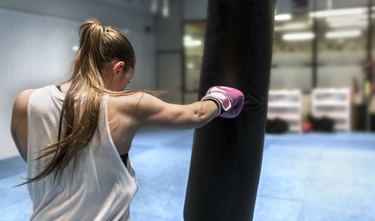
Boxing is an intense sport that creates substantial aerobic exercise and stress on the body. With each punch and block in boxing, you place demand on your muscles, especially in your shoulders, arms and hands.
As a result, you may notice that you have shaking hands after a fight or a training session. Gradually increasing the intensity of your workout, staying hydrated and having a healthy diet will help prevent from shaking after exercise.
Video of the Day
Video of the Day
Shaking From Muscle Exhaustion
When you perform a movement, such as a jab in boxing, your muscles contract in groups called motor units. Each unit consists of a group of muscle cells that receive a message to contract from a nerve cell or neuron. Normally, when all motor units are working, the jab or other movement happens smoothly.
However, as you stress and exhaust your muscles, some motor units will temporarily stop working. When this happens, your movements may become jerky and you will notice your hands and arms shaking.
This is a temporary symptom caused by fatigue. Shaking after exercise will stop after rest. You can help prevent and reduce shaking by taking a break between rounds or exercise sets.
Prevent Fatigue and Shaking
Proper nutrition is key to maintaining your energy and recovering faster. It will also help prevent your hands shaking after boxing. Eating before your workout or fight will help you keep your blood sugar and energy up. Mayo Clinic recommends eating a snack or small meal one to four hours before training. Examples of healthy choices include a turkey sandwich or Greek yogurt and fruit.
Eating after a workout will help your body recover and replenish the carbs you burned off. The Hospital for Special Surgery recommends eating within one hour of finishing your training session.
Staying hydrated will also help maintain your electrolyte balance and prevent fatigue. Drink water throughout the day, not just during your workout.
Read more: Boxing Training Diet
Finally, make sure you are building your strength and endurance slowly. If you are new to boxing or coming back after taking a break, be sure to start slowly. Learn and use proper technique to avoid injury during fast movements and hard impacts from punching. Rest between rounds, especially if you experience shaking after exercise, to give your body a chance to recover.
Hands Shaking From Trauma
Trauma to the nervous system from a blow to the head may also cause shaking hands after a fight or sparring session. You may have peripheral nerve trauma from the impact of hitting a heavy bag.
If your hand shaking doesn't stop, or if you suffered a hit to the head or experienced pain while boxing, consult your doctor.
Other Possible Causes
If your hands continue shaking well after the event or practice session has completed, there may be other underlying reasons for your hands shaking after boxing. It's important to see your doctor to get a full evaluation and diagnosis.
Possible reasons may include simple essential tremors or in rare cases, the beginning of Parkinson's disease. Only your doctor can give you a full idea of what may be causing your hands to shake and how to treat it.